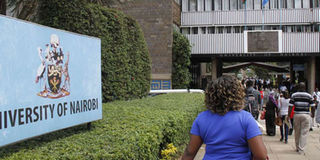Kenyan varsities must adopt modern system to replace annoying practices

Students walk into the University of Nairobi on April 14, 2014. Students are usually subjected to a mandatory end-of-term handwritten exam. PHOTO | JEFF ANGOTE | NATION MEDIA GROUP
What you need to know:
- The very idea of a handwritten in-class essay examination in the 21st-century is retrogressive and encourages rote-learning.
- Unlike in the developed world, we have no formal mentorship mechanisms in our public universities.
In spite of putting up a few ultramodern high-rise buildings on their main campuses, our universities have not fundamentally changed much since the 1960s.
The most annoying thing is their obsession with hierarchies.
While you are likely to find top administrators at Harvard or Princeton on campus going about their daily business or just interacting with staff and students, vice chancellors in Kenyan universities are usually holed up in their offices, which are symbolically located in the tallest building on campus.
VIP
This is to signal to students and staff that the high and mighty are not to be disturbed with petty ideas and feedback.
When the administrators come out of their high-tower offices, they are usually surrounded by bodyguards, henchmen, and academic bootlickers.
Looking at them imitate on campus their VIP colleagues in the national government is like watching a late-night comedy skit.
EXAMS
Local universities have many advantages, including committed staff in spite of poor pay, goodwill and reverence from the public, and students ready to use higher education as a vestibule to a better future.
The University of Nairobi, for example, is one of the best institutions in Africa, and I am proud to have received all my university education there.
But one shocking archaic practice I have noticed at the university, which is replicated in the other Kenyan institutions, is a mandatory end-of-term handwritten exam that accounts for 70 per cent of the student’s final mark.
FEEDBACK
Such an examination emphasises a summative final grade, instead of the more pedagogically useful formative continuous assessment for learning.
Students do not receive feedback after this exam, as their names are not even included in the answer booklets ostensibly to ensure unbiased blind evaluation by the examiners.
The elite British universities on which we modelled our education system in the 1970s, such as Cambridge and Oxford, have already largely moved on from this model, de-emphasising final examinations in favour of formative continuous assessments.
LEARNING
Because they are optional at the American university where I teach, I do not give final examinations, as they add little value to the learning experience.
Their purpose is to just fail or pass the student.
The very idea of a handwritten in-class essay examination in the 21st-century is retrogressive and encourages rote-learning, where you have to plan and memorise your long answers before you have even seen the questions.
My sense of essay writing as an academic practice in the digital age is that you come up with a draft and you keep on shifting parts of the essay around to make your argument clear at the end of the exercise.
CREATIVITY
Even in a simple newspaper article like this one, I’ve had to delete and add sentences, moving things here and there.
It is impossible to do such a thing in a timed in-class handwritten exam.
Based on instrumental end results rather than deep learning processes, the education leads students, including in humanities disciplines that emphasise creativity, to be robotic and merely strategic to produce a final document.
They just want to fulfil the graduation requirements, even if they contribute nothing to scholarship.
In such circumstances, students are tempted to plagiarise.
PLAGIARISE
Allow me to give an example from literature because that’s the subject I teach, although this is probably replicated in other disciplines.
Last month, I read from a local journal a student’s article that was 80 per cent plagiarised from another one published in a Nigerian literary journal.
Disregarding my advice to the editors, the Kenyan journal sounds interested in publishing the work because the students pay through the nose for their essays to appear in such low-calibre vanity venues.
But the publication of the essay will destroy that student’s career, except within the circles of intellectual thieves and academic dwarfs.
MENTORSHIP
I don’t blame the young scholar wholly, though.
Unlike in the developed world, we have no formal mentorship mechanisms in our public universities.
Ideally, a student is supposed to be assigned mentors and advisors upon admission.
They assist the student adjust to the academic world.
SUPERVISORS
In local institutions, even post-graduate students are left in the wilderness to come up with topics and are only assigned “supervisors” once their proposals are accepted.
Those proposals are bound to be thrown away on grounds of not being “academic enough” because the students have had no guidance from a senior scholar in the field on even basic protocol of writing.
In ideal circumstances, post-graduate students in my field, for example, should work with mentors in developing the ideas they want to examine.
MEDIOCRE
But in most Kenyan universities, we are more interested in the final product, instead of the proper processes through which such a product can be constructed.
The end result is mediocre work that cannot earn our students or the universities they graduate from global recognition.
Prof Mwangi teaches at Northwestern University in the US and is a Carnegie African Diaspora Fellow based at the University of Nairobi. [email protected] Twitter: @evanmwangi
Gerry Loughran column resumes next week




